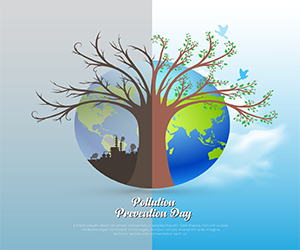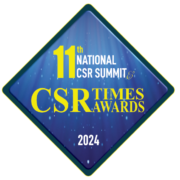
World Pollution Prevention Day that is observed every year on December 2nd, serves as an urgent reminder for all of us to address the environmental challenges that our planet faces. With human activities continuing to degrade the Earth’s natural resources, pollution has become a pressing issue that necessitates immediate attention. A close look at the significance of World Pollution Prevention Day and the measures required to combat pollution to ensure a sustainable future for generations to come is therefore the need of the hour.
This day commemorates the Bhopal Gas tragedy of 1984, an industrial catastrophe that caused widespread death and environmental damage. The unchecked, unexpected pollution has not only destroyed and marred human lives but also permanently damaged the environmental soul of the planet.
Defining Pollution and understanding the causes
For us to truly understand the importance of pollution prevention, it is imperative to define pollution and identify the various sources we can attribute it to. Pollution can be broadly defined as the introduction of harmful substances or contaminants into the environment that cause adverse effects on human health, ecosystems, and biodiversity. Pollution can be attributed to causes that are multifaceted and range from deforestation, industrial emissions, improper waste management, agricultural practices, energy production, and transportation, to name a few, amongst the many other causes.
What are the environmental Impacts of Pollution?
The far-reaching effects of pollution affect both human and natural ecosystems. Air pollution is primarily caused by burning fossil fuels, which in turn contributes to respiratory illnesses and climate change. Water pollution that results from untreated sewage, industrial waste, and agricultural runoff contaminates drinking water sources and poses a big threat to marine life. Soil pollution is often caused by chemical spills and improper waste disposal, which in turn reduces fertility and harm agricultural productivity. Additionally, pollution also disrupts ecosystems, that leads to the extinction of species, loss of biodiversity, and a disturbing imbalance in ecological systems.
It poses Public Health Hazards
An alarming effect of pollution is the significant risks it poses to human health. Air pollution increases the prevalence of respiratory and cardiovascular diseases, while food chains are contaminated through water pollution, that leads to waterborne illnesses too. Toxic substances enter the food we consume through soil pollution, which gives rise to various health issues. The risk of pollution has long-term implications too, which include developmental disorders, reduced life expectancy and cancer. On World Pollution Prevention Day, we are reminded of the importance of safeguarding public health by implementing effective pollution prevention strategies.
A quick glance at Global Efforts and Initiatives
The global community has, in recent years, recognized the need for concerted efforts to combat pollution. International agreements have been formulated with this in mind. The Paris Agreement and the United Nations Sustainable Development Goals highlight the urgency of addressing pollution to achieve and safeguard a sustainable future. Various initiatives have been undertaken by various Governments, organizations, and individuals to reduce pollution. Some of them are: implementing better waste management practices, transitioning to renewable energy sources, promoting sustainable transportation, and adopting cleaner production methods. The theme for the National Pollution Control Day in 2023 was “Sustainable Development for a Clean and Healthy Planet.” This is a relevant theme since it stresses the interconnectedness of sustainable
development and environmental protection to ensure a healthy planet for our future generations. It emphasizes the need for adopting environmentally friendly practices that will help achieve the objective of sustainable development.
While pollution remains a global challenge posing a mammoth threat to our eco systems and human health, what are some of the key solutions we can embark on to do away or minimize this hazard? While contemplating counter measures to combat this, we must include our responses to the varied forms of this pollution—air, water and spoil pollution, amongst a host of other forms—that lead to human illnesses and environmental degradation.
A multi-pronged approach that harbors different solutions could be as follows:
- Introducing Stricter Environmental Regulations: By enforcing stricter regulations pertaining to the environment and imposing a set of strict standards to control emission and discharges emanating from industries and other sources of pollution,.
- Encouraging the promotion of sustainable practices: agriculture, Industries and transportation sectors can adopt more sustainable practices, which include using cleaner technologies and reducing and minimizing the consumption of resources.
- Raising awareness of the public and educating the masses on the causes of pollution and related actions for its’ control: By imparting relevant knowledge about the sources of pollution and related activities, responsible behavior from the masses can be encouraged. They can also be motivated enough to adopt the relevant initiatives and contribute positively towards pollution control through their environmental protection initiatives.
- Supporting investments made in research and development of pollution control initiatives When initiatives are launched on pollution control and environmental protection, we will lend our support in whatever way possible to further these initiatives. While the above-mentioned initiatives target the masses and can be termed as large-scale environmental initiatives, there are a complete set of individual actions which can play a significant and crucial part in determining where we can contribute our bit. These are enumerated below:
- Reducing our energy consumption: We can switch to energy-efficient appliances for our personal use, conserve water and adopt all such measures that contribute towards an eco-friendly habit. Ee
- We can opt for sustainable transportation. Instead of opting for personal transportation, we can shift to using public transport. We can cycle, walk, use the stairs instead of elevators wherever possible, use car pools and minimize, if not nullify, our carbon footprints.
- We can minimize waste generation. We can contribute by reducing our waste, supporting reusing and recycling waste practices, diverting waste form landfills, conserving resources,
- We can support sustainable Businesses. We can choose and buy products and services from companies that are committed to ethical practices and environmental sustainability.
- We can spread awareness and encourage action on pollution control. We can educate people about the detrimental effects of pollution and encourage them to adopt eco-friendly practices.
- We can promote technological advancements. This day encourages research and development of innovative technologies on environmental protection and pollution control, and we can support the promotion of initiatives that suggest the need for promoting cleaner technologies and sustainable solutions.
- We can foster Community Engagement: by supporting, participating in, or organize clean-up drives, energy conservation efforts and waste management programs. Every year, the 2nd of December comes with a reminder of the current alarming level of global pollution and hope for a better, greener and unpolluted future. The need of the hour is collective action and individual responsibility to tackle this looming global problem. As an inhabitant of this wonderful planet, the onus of safeguarding the future lies in our hands!



































